Just a few years ago, the idea of AI actively transforming customer experiences (CX) in real time sounded like something out of a tech keynote or a sci-fi film. Fast-forward to today, and that vision isn’t futuristic anymore—it’s reality. AI has quickly moved from hype to hands-on utility, and for call centers, it’s not just a game-changer—it’s redefining the rules entirely.
From voice-enabled automation to intelligent agent assistance, AI is already embedded in the daily flow of customer service. It's working behind the scenes to analyze sentiment, surface the right information, and route calls more effectively. Whether customers realize it or not, AI is helping deliver faster, more personalized, and more consistent customer experiences.
And for call center professionals, this shift is particularly profound. Contact centers are on the front lines of CX, where speed, empathy, and accuracy matter most. Embracing AI isn’t about replacing agents—it’s about empowering them, enhancing their performance, and meeting rising customer expectations without burning out staff.
We’re not preparing for an AI-driven future of CX—we’re living it right now. And the organizations that lean into this shift will be the ones that set the new standard for customer loyalty and operational excellence.
What is The Current State of CX in Call Centers?
Before diving into what AI is doing for customer experience, it’s important to understand the landscape it’s entering—and transforming.
Call centers today are facing more pressure than ever. Customer expectations have risen sharply. People expect fast, personalized, and seamless service on every channel, and they don’t want to repeat themselves or be bounced around. At the same time, customer issues are becoming more complex, especially as self-service deflects simpler questions to digital channels.
Agents are feeling the heat, too. High interaction volumes, limited resources, and tight performance metrics often lead to stress and burnout. Many contact centers struggle with agent turnover and lengthy onboarding cycles, both of which impact service quality.
In short, traditional approaches can’t keep up. Static scripts, siloed systems, and manual processes are holding teams back. The need for a more adaptive, intelligent, and responsive way to deliver CX has never been greater. That’s exactly where AI comes in—not as a futuristic concept, but as a practical solution to today’s most pressing challenges.
How is AI Already Reshaping the Call Center Experience?
AI is no longer a buzzword in the call center space—it’s a set of tools actively reshaping how customer service is delivered. Whether enhancing live calls, powering self-service, or surfacing insights in real time, AI is quietly becoming the backbone of the modern contact center.
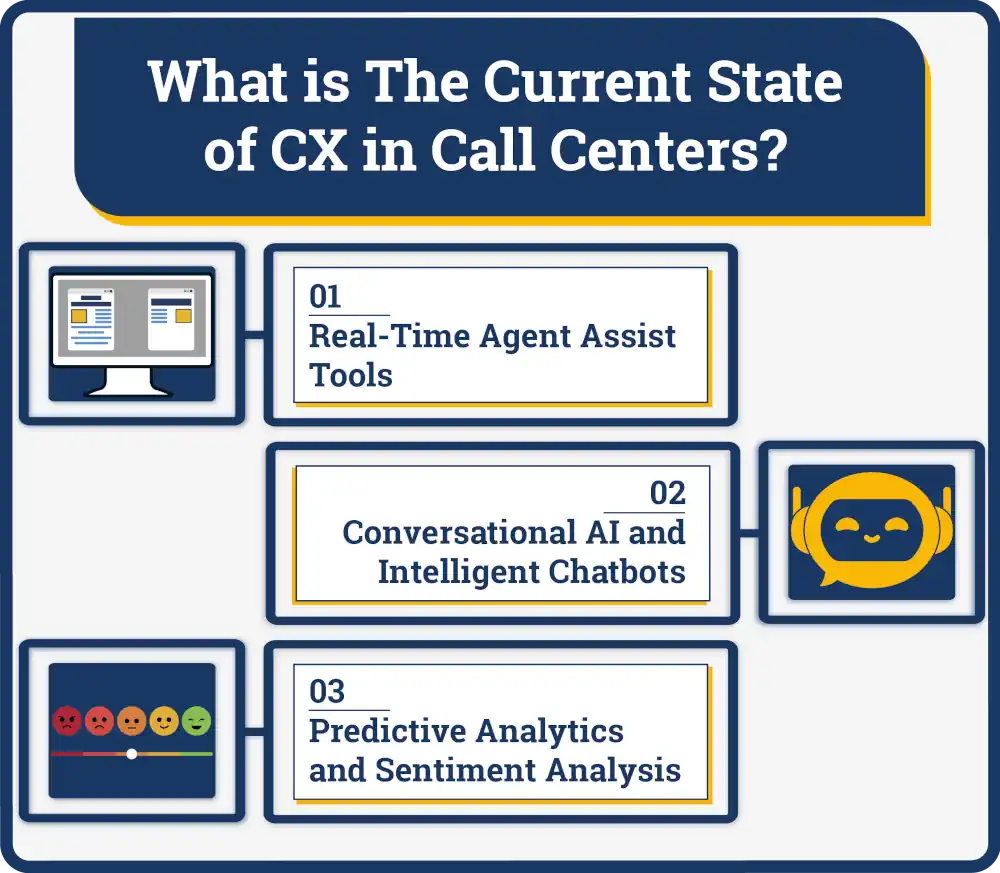
Let’s take a look at how AI is already transforming the customer experience in tangible ways:

1. Real-Time Agent Assist Tools
One of the most powerful AI applications is happening behind the scenes—supporting agents as they engage with customers. AI-driven agent assist tools can automatically listen to live calls, analyze the conversation, and surface relevant knowledge base articles or suggested responses in real time. This means agents spend less time searching for answers and more time focusing on the customer.
These tools also help with process adherence by prompting agents with reminders or compliance cues when needed, reducing human error and improving resolution accuracy. Ultimately, agent assist tools help improve key performance indicators like FCR and AHT, both critical to customer satisfaction and operational efficiency.

2. Conversational AI and Intelligent Chatbots
On the front lines, conversational AI is playing a major role in handling routine interactions. AI-powered chatbots can now manage tasks like password resets, order tracking, or appointment bookings with a high degree of accuracy and a conversational tone that feels natural to customers.
Importantly, these bots aren’t working in isolation. When they encounter complex issues, they can hand off the interaction—along with full context—to a live agent, ensuring a smooth and frustration-free transition. This not only reduces wait times but also ensures agents are focused on the types of conversations where their skills and empathy matter most.
With 24/7 availability and the ability to scale instantly, conversational AI is becoming an essential part of any omnichannel CX strategy.

3. Predictive Analytics and Sentiment Analysis
AI can also analyze historical and real-time data to identify patterns and predict customer needs. For example, by examining a customer’s previous interactions, AI can predict the purpose of a call or even flag potential issues before they escalate.
Sentiment analysis tools go a step further—using natural language processing (NLP) to detect customer emotion during interactions. This enables better call routing, escalation management, and even post-call coaching for agents. If a customer is showing signs of frustration, the system can alert a supervisor or prioritize a follow-up, allowing the organization to be proactive rather than reactive.
These innovations aren’t abstract—they’re already being used to improve outcomes, reduce churn, and elevate both customer and agent experiences.
What are The Benefits of AI for Agents?
While much of the conversation around AI in CX focuses on automation and efficiency, the real game-changer lies in how AI supports the people behind the calls—your agents. Rather than replacing them, AI is acting as a powerful co-pilot, taking the pressure off and allowing agents to do their best work.
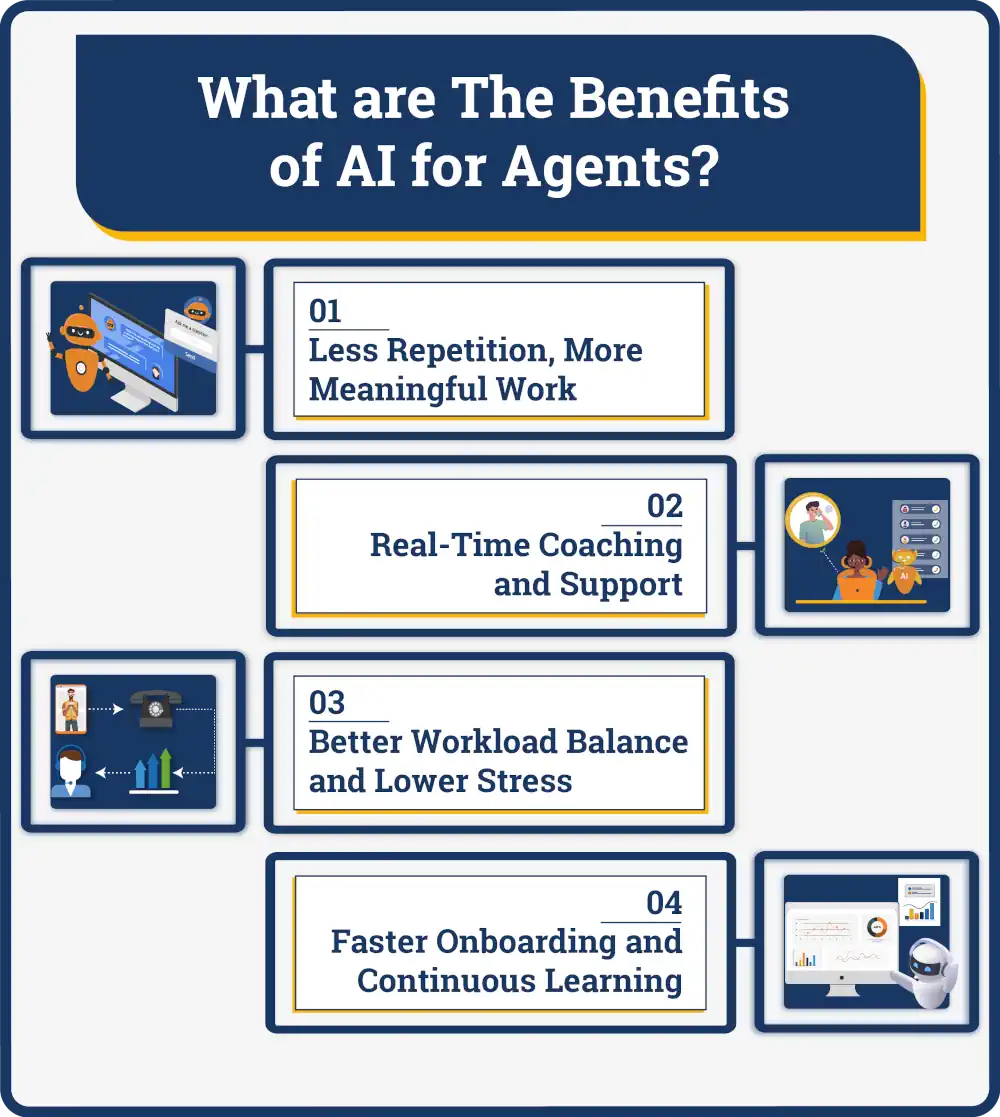
Here are some of the key benefits AI is bringing to call center agents:
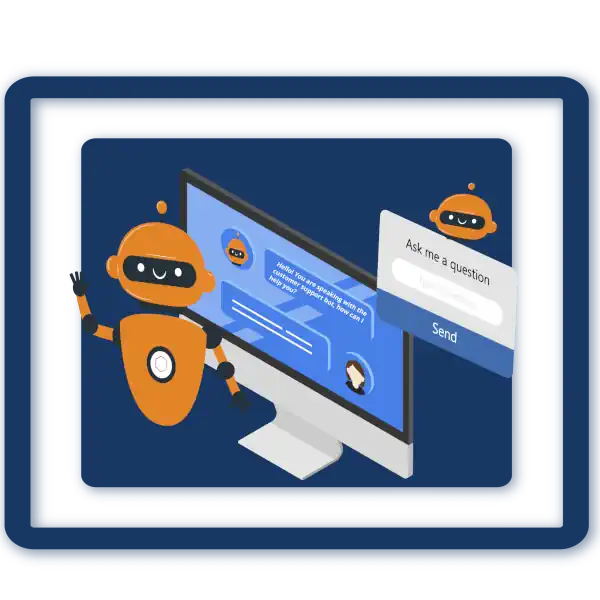
1. Less Repetition, More Meaningful Work
AI automates repetitive, time-consuming tasks like data entry, form filling, or verifying account details. By offloading these mundane activities, agents can focus on solving complex issues and building genuine customer relationships—areas where human empathy and problem-solving are irreplaceable.
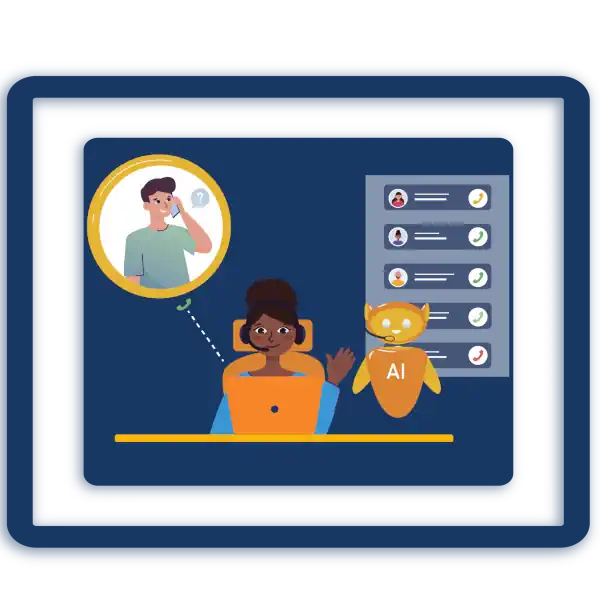
2. Real-Time Coaching and Support
AI tools can act like a real-time coach, offering tips, compliance prompts, and knowledge suggestions while the conversation is still in progress. For newer agents, this means less time fumbling through training materials and more confidence on the floor. For experienced agents, it’s a productivity booster that ensures they always have the right information at their fingertips.

3. Better Workload Balance and Lower Stress
With AI helping to route calls more intelligently and handle basic interactions, agents experience fewer spikes in workload and less queue fatigue. This translates to lower stress levels and better morale—factors that directly impact customer interactions and reduce turnover.

4. Faster Onboarding and Continuous Learning
AI can personalize onboarding experiences by identifying individual learning gaps and delivering targeted microlearning modules. It also tracks performance and offers tailored feedback, making professional development more dynamic and data-driven.
What are the Challenges and Considerations of AI-Powered CX?
While the benefits of AI in call centers are compelling, adopting this technology isn’t without its hurdles. As with any major shift, integrating AI into the customer experience comes with a new set of responsibilities—for both leaders and frontline teams.
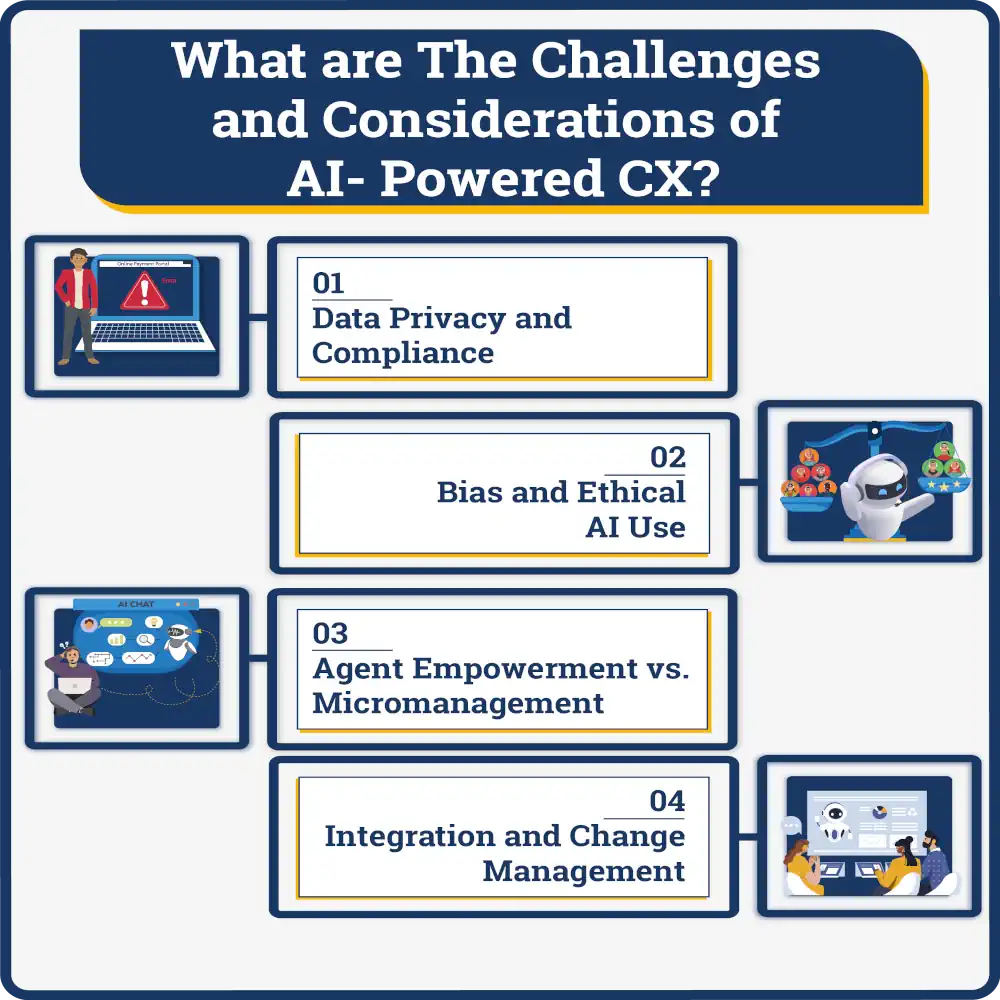
Here are some of the most pressing challenges and considerations that call centers must address to ensure AI enhances rather than disrupts the customer experience:

1. Data Privacy and Compliance
AI thrives on data. To deliver personalized and predictive experiences, it must access and analyze vast amounts of customer information. That creates an urgent need to safeguard privacy and maintain compliance with regulations such as GDPR, CCPA, and HIPAA (depending on your industry).
Call centers must be transparent about how customer data is collected, stored, and used—and ensure any AI tools are compliant by design. A single breach of trust can erode brand loyalty and trigger regulatory consequences.

2. Bias and Ethical AI Use
AI is only as good as the data it's trained on. If that data contains bias—intentional or not—the outcomes can be skewed and unfair. This is particularly concerning in areas like predictive call routing, sentiment analysis, or churn prediction, where biased algorithms could lead to inconsistent service quality.
For example, if an AI-powered call routing system is trained on biased historical data—say, where certain customer groups were disproportionately escalated or given longer handle times—it could unintentionally continue that bias by routing similar customers in the same way. This would reinforce inequality in service levels and damage customer trust.
Call center leaders need to work with AI vendors who prioritize ethical development practices and offer visibility into how AI decisions are made. Ongoing auditing and inclusive training data are essential to building fair, responsible AI systems.
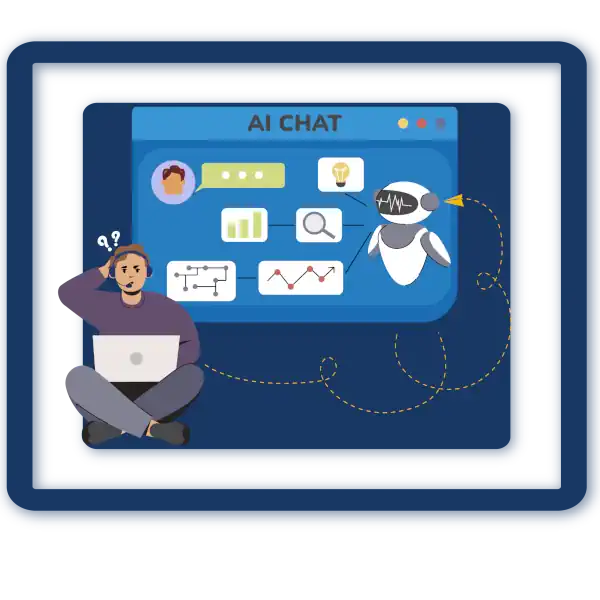
3. Agent Empowerment vs. Micromanagement
While AI provides real-time guidance and performance tracking, it’s important that these tools don’t cross the line into micromanagement. Overly prescriptive AI can make agents feel monitored or constrained, leading to disengagement and resistance to adoption.
Instead, AI should be positioned as a coach and collaborator, not a controller. When agents see AI as a tool that helps them succeed—not one that second-guesses them—they’re far more likely to embrace it.

4. Integration and Change Management
AI tools often require integration with existing systems like CRMs, ticketing platforms, and telephony. Without seamless integration, these tools can create more friction than they solve.
Moreover, introducing AI into a call center requires thoughtful change management. Agents and managers need training, clear communication, and a voice in how new tools are implemented. Resistance often stems from fear of the unknown—something that can be addressed through transparency, involvement, and support.
AI is not a plug-and-play solution. Its success depends on careful planning, ethical oversight, and a focus on people as much as technology. When call centers address these challenges head-on, they pave the way for AI to truly elevate both employee and customer experiences.
